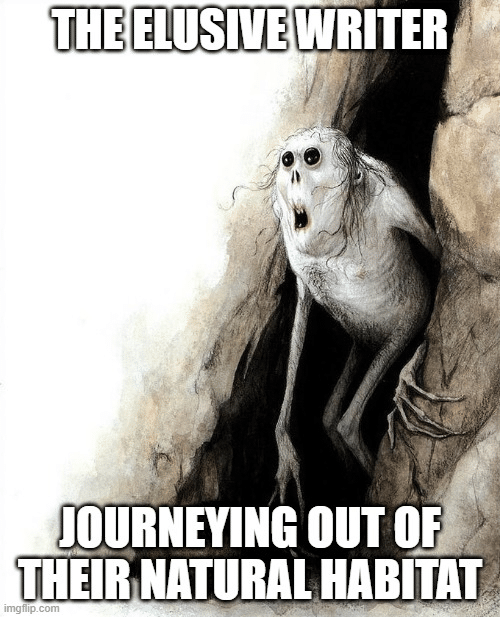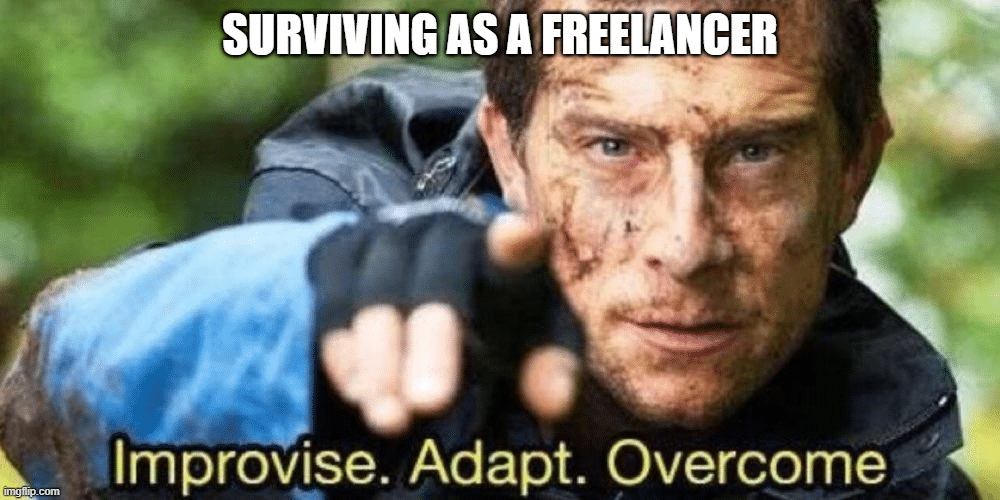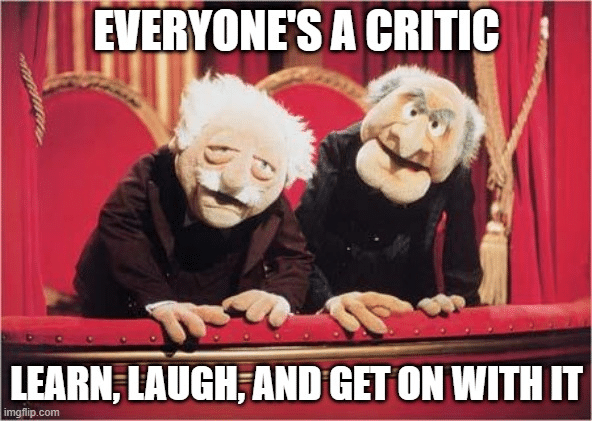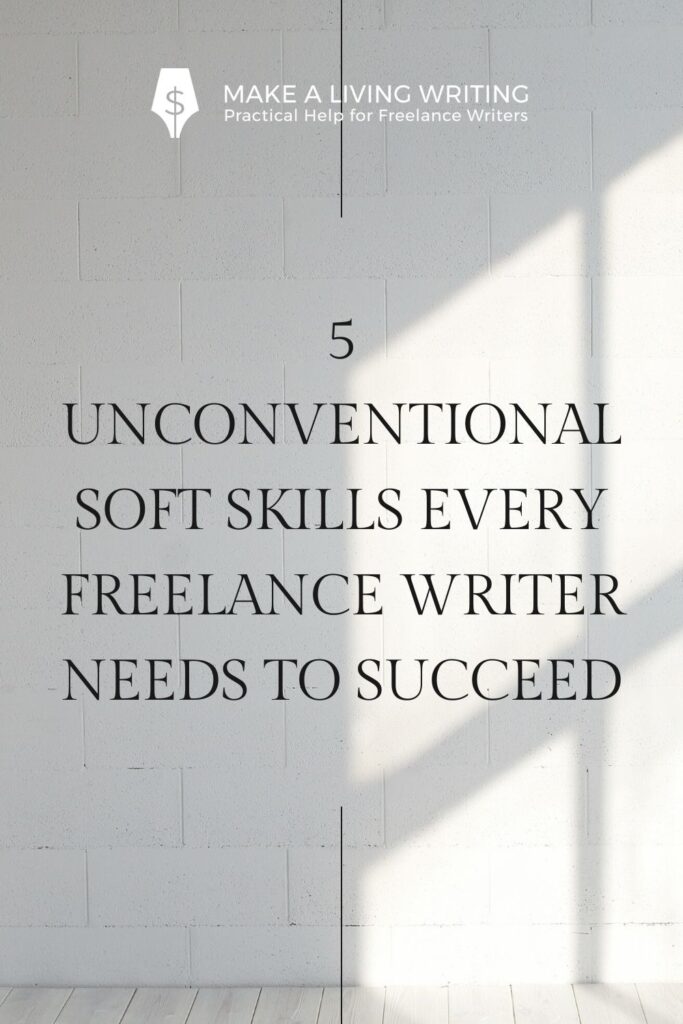Many people consider freelance writing is often considered a dream job, but the fierce competition for well-paying jobs has folks wondering if they have what it takes.
In an effort to build their confidence as they hunt for a bit of gold in the cyber dust, they drill themselves on the hard skills.
However, success does not fully stem from hard work and the delivery of a modernized sheep skin (certificate).
What makes someone a successful freelance writer boils down to how they utilize the soft skills that already exist within.

I’m talking about those attributes you already have, the ones you obtained before you even picked up the pen (keyboard?).
Now, I know there is a dictionary’s worth of soft skills out there, but for the purpose of this article I’m going to cover the top five soft skills freelance writers need both on and off the page.
Wait, what do you mean you’re worried you don’t have soft skills?
Do you hear my sigh? Look, how about this: I’ll go over the top five soft skills you need and I’ll provide you with ways you can develop them if you feel like you’re lacking. Feel better?
Great, let’s begin.
5 Soft Skills Every Freelance Writer Needs

1. Creativity
Yes, you need creativity.
This should be a no-brainer, but did you know that the level of creativity you are capable of expressing can be in short supply if you suffer from the likes of chronic imposter syndrome, invite self-doubt into your idea process or subscribe to the all work and no play makes me a productive member of society ideology?
Creativity is not cultivated in the negative void of a vacuum. So, it is pertinent that we feed it with the vibrancy of our excitement, nourish it with our curiosity and coddle it with affirmations like, “No idea is dumb,” and, “You can produce anything you set your mind to.”
Now, if you find yourself as brain dead as a zombie, then consider this article a prescription from me, as your unofficial word-doctor, and spend at least 30 minutes a day playing and exploring the world around you. That’s right Alice, I want you to fall down the rabbit hole, and while you’re at it jot down every idea or curious notion that fires between your neurons.

2. Communication
Words on the page have one purpose: communicate a message to the person reading them.
However, being a freelance writer goes beyond getting words onto the page.
There are potential clients to nurture, editors to keep in the loop, and fellow writers whose radars you want to stay on because you never know when they might have a tip that could land you your next job.
I know those of you who are introverts got into this line of work thinking you could finally let out your inner Gollum as you whisper, “my precious,” to your keyboard but, as with any industry, freelance writing is not about what you know. It’s about who you know.
So my little wall flower, time to unpeel yourself from the archaic jacquard print that lines your walls and build up your social equity.
Join a writers group (local or virtual), go to writer conferences, share what you are passionate about and what you are interested in writing about with people. When you make the effort to knock on those metaphorical doors, opportunities will open.

3. Adaptability
Ideas are a dime a dozen, and you’ve overcome your anxiety about pitching them to an editor as you finally click, “Send.” Congratulations!
Your inbox now reads, “1 New Email.”
You click…click again…recall the years of dial up….
There we go! A few short words are scrawled across a sea of white pixels and reads something akin to, “I like it, but do you think you could….”
Breathe. Relax.
The editor wants you to tweak your idea a bit to fit their needs. Tell your ego to take a hike, say yes and accept the job.
Afterall, the goal of outreach isn’t about having your ideas validated, it’s about fostering open communication and building relations with current and future clients.
A good writer can write about their own interests. A great writer can craft words into anything their client desires.
So, how do you nurture this skill? Try something new or, better yet, try something that you otherwise wouldn’t. Step out of your comfort zone and explore the wild. Become curious about the unknown. Say yes.

4. Critical Thinking
I’m often asked where I get my ideas from. When it comes to freelance writing, I’ve got to chalk it up to my application of critical thinking.
You see, I observe the world around me, and keep an ear out for the questions people are requesting answers to or statements like, “I wish I knew this before….” Then I think about the path that provides the least amount of resistance to the solution, and pitch that idea to an editor.
It sounds simple, but people often dismiss curious questions to the likes of common knowledge, common sense, Google—you know, that virtual space where freelance writers provide information to inquiring minds.
In today’s society, people have all but forgotten the smell of roses thanks to technology providing us each with our own personal prison in the form of tiny screens.
If you feel you need work in critical thinking, then set down the mobile and pay attention to the questions being asked around you.
Remember, no question is stupid when it could appear in a Google search with your article as the answer. When you find a question, ask yourself: how can I create a succinct and engaging answer? Free your mind, look up, observe the world and listen.

5. Openness to Criticism
It’s time to face the facts: writing is an art.
That said, art is subjective and everyone’s a critic.
- You will get people who are nothing more than trolls trying to break down your bridge to success
- You will get people who know nothing about what you do, but they still feel the urge to voice their opinion on how they think you can improve
- You will have people who have more experience in writing who are willing to offer a tip or two. After all, some mistakes require a second pair of eyes before we realize they exist, it’s part of why we work with editors
The key to criticism is to not take any of it personally.
Opinions vary and it is impossible to please everybody. So, take all the criticism you receive with a grain of salt, flavor your future work with the useful bits and discard the rest. The writers who don’t succeed are the ones who give up because they refuse to learn how to sift out the junk and treasure the nuggets of wisdom that comes from experience.




